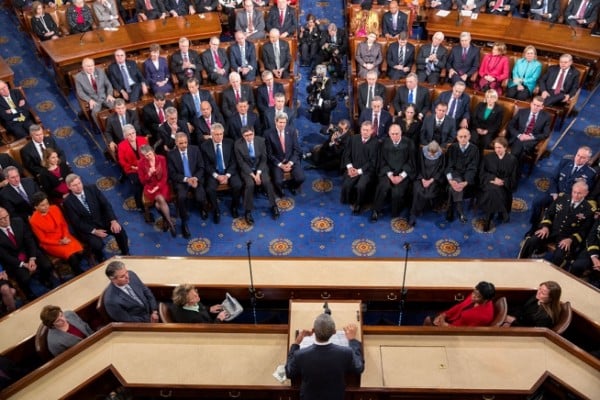
Justice Ginsberg finds the floor fascinating. (Official White House Photo by Chuck Kennedy)
President Barack Obama’s 2014 State of the Union address on Tuesday, January 28, addressed a number of foreign policy issues, from Iran, the Israel-Palestine conflict and the winding down of a 13-year war in Afghanistan. There were, however, some significant gaps. Here are three of them:
1.) Military sexual assault
Despite a heavy focus on women’s rights and on veterans from the wars in Afghanistan and Iraq, this year’s State of the Union address saw no mention of the issue of military sexual assault. A majority of these crimes go unreported; there are an estimated 19,000 sexual assault incidences in the military per year. It’s an omission some have referred to as “glaring.”
As Nora Caplin-Bricker pointed out in the New Republic, both the speech’s timing and the issue’s bipartisan appeal make this omission odd. First, the administration assembled a task force to address sexual assault on college campuses, and released a report on sexual assault from college campuses to the military barracks. Second, the 2014 National Defense Authorization Act included provisions amending the Uniform Code of Military Justice, particularly articles 120 through 120(c), to provide better protection and oversight. Third, Harry Reid (D-NV) announced Monday that the Senate would take on the issue in February—a debate that highlight the differences in approach between two of Obama’s Democratic colleagues, Sens. Kirsten Gillibrand (D-NY) and Claire McCaskill (D-MO). Finally, it’s a bipartisan issue—it’s brought together lawmakers from both sides of the aisle, and has even drawn the attention of the Tea Party.
2.) Agency drone “wars”
First, Obama’s speech glossed over the struggles the White House has faced with implement its own reform of the U.S. drone program. While Obama asserted Tuesday night that he has “imposed prudent limits on the use of drones,” the reforms the administration promised—particularly increasing transparency by switching the drone program over to the Pentagon rather than the Central Intelligence Agency—have largely fallen by the wayside. Most recently, the $1.1 trillion federal budget plan approved by Congress included a classified annex restricting using funds to move unmanned aerial vehicles from the CIA to the Pentagon. Many, including Sen. John McCain (R-AZ), learned of this from a Washington Post article. McCain lambasted both the House and Senate Appropriations Committees:
“The Appropriations Committee is supposed to appropriate. The Appropriations Committee has no business making these decisions….A major policy decision that has to do with the ability to defend this nation…is now being decided in a secret annex of a mammoth appropriations bill.”
Congress has vested interest in keeping the drone program unchecked — this most recent move demonstrates its commitment to that. What moves the White House will make in response have yet to be seen.
3.) Drone bases in Afghanistan
Ending the war in Afghanistan may have catastrophic effects on U.S. drone activities in Pakistan. Afghanistan has served as a base for drone operations for years. Its proximity to the mountainous regions of Pakistan, a safe have for the remnants of al Qaeda’s central leadership, makes Afghanistan an ideal launching point for conduction surveillance and strikes. However, a failure on the part of the Hamid Karzai to agree to a security pact by the end of the year could result in a full troop withdrawal, forcing these bases to shut down.
4.) The National Security Agency and the state of American intelligence
This one isn’t entirely fair: Obama did bring up the backlash caused by the Snowden leaks. However, given the additional leaks since his NSA speech, it’s safe to say he gave too little attention to the subject. He said:
America must move off a permanent war footing…. That’s why, working with this Congress, I will reform our surveillance programs because the vital work of our intelligence community depends on public confidence, here and abroad, that privacy of ordinary people is not being violated…. [W]e counter terrorism not just through intelligence and military action but by remaining true to our constitutional ideals and setting an example for the rest of the world.
To his credit, Obama already outlined his administration’s strategy, however weak, to “restore trust” in the NSA’s activities and reign in some intelligence activities. But given that 68 percent of respondents believe NSA surveillance of telephone records and Internet traffic intrudes on an individual’s privacy, according to an ABC-Post poll conducted in November, it’s an issue that should have gotten more play. There’s no way, as Conor Friedersdorf pointed out in the Atlantic, that a single sentence can address what has sparked one of the largest and most complicated policy debates Congress will face this year.
Anything else you would add? Remove? Tell us in a comment or tweet at me @hannahgais.